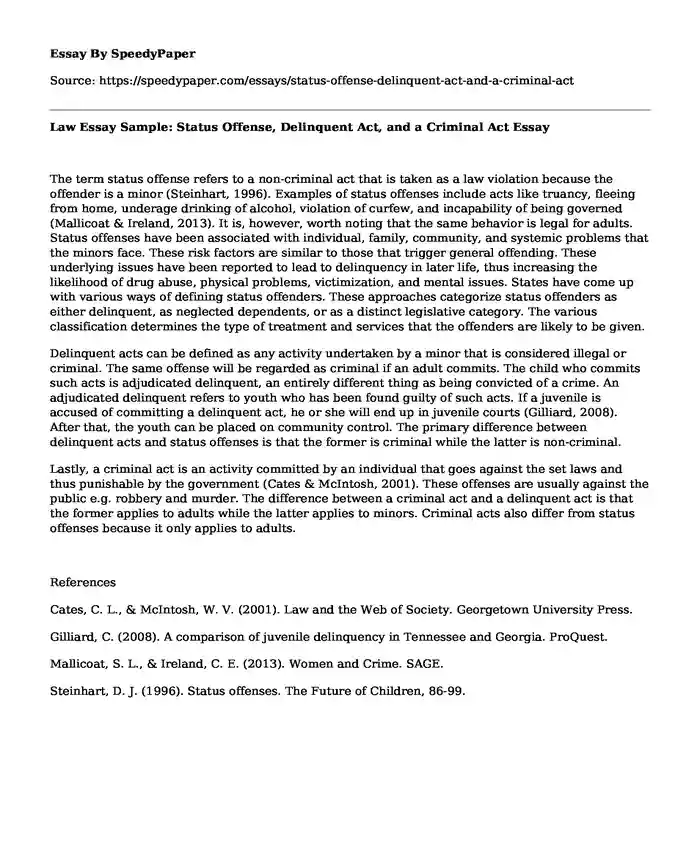
| Type of paper: | Essay |
| Categories: | Law Criminal law |
| Pages: | 2 |
| Wordcount: | 400 words |
The term status offense refers to a non-criminal act that is taken as a law violation because the offender is a minor (Steinhart, 1996). Examples of status offenses include acts like truancy, fleeing from home, underage drinking of alcohol, violation of curfew, and incapability of being governed (Mallicoat & Ireland, 2013). It is, however, worth noting that the same behavior is legal for adults. Status offenses have been associated with individual, family, community, and systemic problems that the minors face. These risk factors are similar to those that trigger general offending. These underlying issues have been reported to lead to delinquency in later life, thus increasing the likelihood of drug abuse, physical problems, victimization, and mental issues. States have come up with various ways of defining status offenders. These approaches categorize status offenders as either delinquent, as neglected dependents, or as a distinct legislative category. The various classification determines the type of treatment and services that the offenders are likely to be given.
Delinquent acts can be defined as any activity undertaken by a minor that is considered illegal or criminal. The same offense will be regarded as criminal if an adult commits. The child who commits such acts is adjudicated delinquent, an entirely different thing as being convicted of a crime. An adjudicated delinquent refers to youth who has been found guilty of such acts. If a juvenile is accused of committing a delinquent act, he or she will end up in juvenile courts (Gilliard, 2008). After that, the youth can be placed on community control. The primary difference between delinquent acts and status offenses is that the former is criminal while the latter is non-criminal.
Lastly, a criminal act is an activity committed by an individual that goes against the set laws and thus punishable by the government (Cates & McIntosh, 2001). These offenses are usually against the public e.g. robbery and murder. The difference between a criminal act and a delinquent act is that the former applies to adults while the latter applies to minors. Criminal acts also differ from status offenses because it only applies to adults.
References
Cates, C. L., & McIntosh, W. V. (2001). Law and the Web of Society. Georgetown University Press.
Gilliard, C. (2008). A comparison of juvenile delinquency in Tennessee and Georgia. ProQuest.
Mallicoat, S. L., & Ireland, C. E. (2013). Women and Crime. SAGE.
Steinhart, D. J. (1996). Status offenses. The Future of Children, 86-99.
Cite this page
Law Essay Sample: Status Offense, Delinquent Act, and a Criminal Act. (2018, Jan 12). Retrieved from https://speedypaper.net/essays/status-offense-delinquent-act-and-a-criminal-act
Request Removal
If you are the original author of this essay and no longer wish to have it published on the SpeedyPaper website, please click below to request its removal:
- Essay Sample on Primary Objective: Residency, Pediatric Programs
- Free Essay Sample on NAHQ Code of Ethics
- Psychology Essay Sample - To Love Others, Love Yourself
- Risk Analysis at Tesco Ltd, Free Essay in Risk Management
- A Philosophical Discourse Essay, Free Example
- Essay Sample: Image of Women in the Selected Stories of Lu Xun and in the Joy Luck Club
- Essay Sample on Physiological Mechanism Underlying the Stress Symptoms
Popular categories




